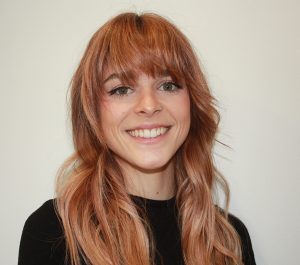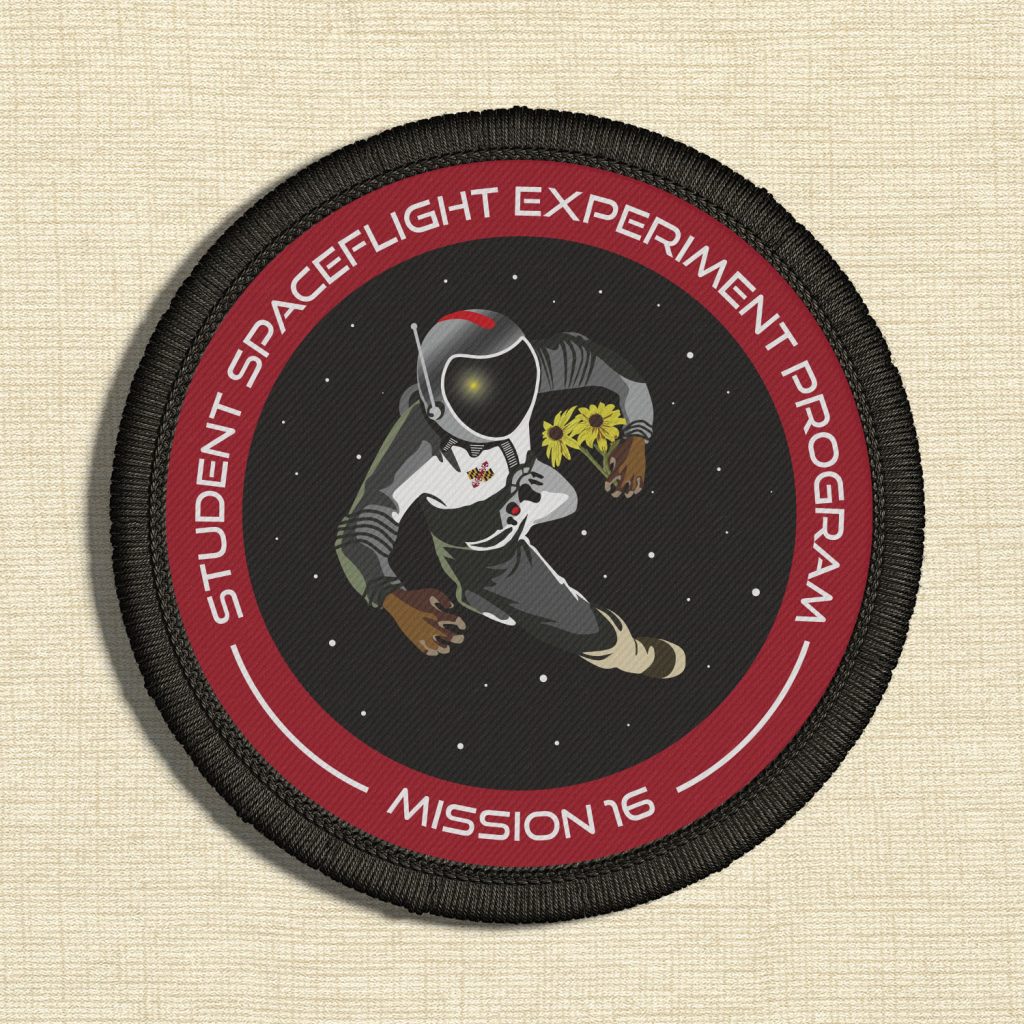
SALISBURY, MD – When Salisbury University alumna Kennedy Workman ’21 interviews for jobs throughout her graphic design career, she will have a line on her résumé that will set her apart from others: A piece of Workman’s work will have traveled into space.
Her mission patch design was chosen as the winner of a competition for Terps in Space, an extension of the Student Spaceflight Experiments Program (SSEP). The program allows students in the University System of Maryland (USM) to design science experiments to potentially be sent to the International Space Station.
“My artwork is not out in a lot of places, but I will be able to say that it’s been to space, which is incredibly exciting,” said Workman.
Based out of the University of Maryland, College Park (UMCP), the program is led by Daniel Enrique Serrano, senior faculty specialist at the Institute for Physical Science and Technology, and is open to all USM students. The project selected to travel to space as part of Mission 16, for which Workman’s patch was created, was developed by a collaboration of students from UMCP and the University of Maryland, Baltimore County.
“All University System of Maryland students are invited to participate,” said Serrano. “It means a lot to achieve that collaboration, like the team that won Mission 16, where you have students that are coming from different universities to do research, and for Kennedy to represent our entire mission visually being from a different university. My contribution is small, but it makes me proud to be able to bring these students together.”

Blank black and white round embroidered patch mockup, top view, 3d rendering. Empty cloth attachment for sing icon mock up, isolated. Clear circular stitches symbolic template.
Workman, from Glenwood, MD, and other students in the SU Design Agency, a course led by Allison Seth, were given a brief description of the project and asked to create their version of a representative patch, similar to what one might see an astronaut wear on their spacesuit. Though no astronaut will wear this patch, it will be sent up with the project – expected to travel later this year – and then will be returned to Workman with a certificate stating that it traveled to space.
The patch represents the project’s basis on microgravity. Researchers will examine the fine details of how planets first began to form by investigating how the smallest particles interact and coalesce to begin forming a larger mass.
“I really wanted to utilize an astronaut helmet or an astronaut floating in space to represent the human exploration of space and gravity,” said Workman. “I looked at a lot of different pictures of astronauts because I wanted it to feel like they were floating out of the patch design and not too stagnant.”
Workman studied spacesuits in images of astronauts and others illustrations to develop her rendering and received praise from the judges, as her design closely represents what an authentic suit looks like. One intentional variance was to not have the astronaut in the design wearing gloves, as Workman “thought it made it more intimate and human for his bare hands to be holding flowers as he floated in space.”
The flowers are part of the design’s goal of representing Maryland.
“I wanted to incorporate the state flower; that’s why the astronaut is holding black-eyed Susans. And they also have the state flag on their astronaut suit,” she said. “I tried to keep the color palette with the colors of Maryland and reflect the colors in different areas of the design, like the yellow reflection in the astronaut’s helmet, and the red stripe on the helmet and the banner around the entire patch design.”
Workman was first selected as one of 11 finalists, from 44 designs submitted from across the state, to go to final judging. SU classmate Jennifer Cueva’s design was selected as the third-place finisher.
“Kennedy’s patch was one of the most refined and highest quality in terms of visual representation,” said Serrano. “Her being selected was by a landslide across the board by all the judges as the best design.”
The project likely will launch from Cape Canaveral in Florida. Workman would like to be present, if possible, or at least view the launch of her artwork into space remotely.
“I think it will be very, very exciting to see it launch,” said Workman. “I would love to see pictures of the patch on the International Space Station.”
The SU Design Agency is a 400-level class in which students work in a setting structured like a graphic design firm to complete job assignments for actual clients, including University, community and nonprofit organizations.
The SSEP is a program of the National Center for Earth and Space Science Education (NCESSE) in the U.S. and the Arthur C. Clarke Institute for Space Education internationally. It is enabled through a strategic partnership with Nanoracks LLC, which is working with NASA under a Space Act Agreement as part of the use of the International Space Station as a National Laboratory.
Learn more about how SU students and faculty make tomorrow theirs at the SU website at www.salisbury.edu.



